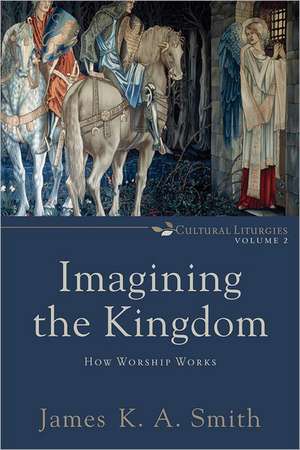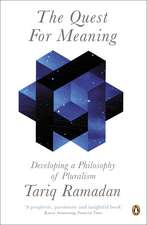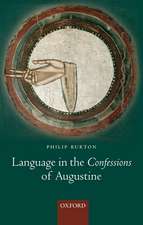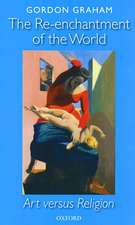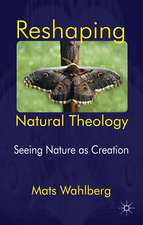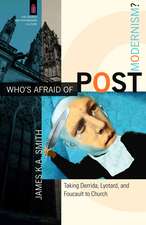Imagining the Kingdom – How Worship Works
Autor James K. A. Smithen Limba Engleză Paperback – 14 feb 2013
Professors and students will welcome this work as will pastors, worship leaders, and Christian educators. The book includes analyses of popular films, novels, and other cultural phenomena, such as "The King's Speech," "Rise of the Planet of the Apes," David Foster Wallace's "Infinite Jest," and Facebook.
Preț: 131.53 lei
Nou
Puncte Express: 197
Preț estimativ în valută:
25.17€ • 27.33$ • 21.14£
25.17€ • 27.33$ • 21.14£
Carte disponibilă
Livrare economică 01-15 aprilie
Livrare express 15-21 martie pentru 22.13 lei
Preluare comenzi: 021 569.72.76
Specificații
ISBN-13: 9780801035784
ISBN-10: 0801035783
Pagini: 224
Ilustrații: black & white illustrations
Dimensiuni: 152 x 229 x 12 mm
Greutate: 0.3 kg
Editura: Baker Publishing Group – Baker Books
ISBN-10: 0801035783
Pagini: 224
Ilustrații: black & white illustrations
Dimensiuni: 152 x 229 x 12 mm
Greutate: 0.3 kg
Editura: Baker Publishing Group – Baker Books
Textul de pe ultima copertă
A Liturgical Theology of Culture
""Imagining the Kingdom" is a fit successor to Jamie Smith's remarkable "Desiring the Kingdom." The new book is, like its predecessor, learned but lively, provocative but warmhearted, a manifesto and a guide. Smith takes Christians deeper into the artistic, imaginative, and practical resources on which we must draw if we wish to renew not only our minds but also our whole beings in Christ."
--Alan Jacobs, Honors College of Baylor University
"In this wonderfully rich and engagingly readable book of 'liturgical anthropology, ' Smith makes a persuasive case for the thesis that human beings are best understood as worshiping animals. It has important implications at once for practical theology's reflection on religious formation, liturgy, and pedagogy and for philosophical theorizing about just what religion is. And it develops as an engaging and lively conversation among an astonishing mix of people: imagine Calvin, Proust, Merleau-Ponty, Augustine, Wendell Berry, Bourdieu, and David Foster Wallace all in the same room really talking to each other about being human and how to think about it!"
--David Kelsey, Yale Divinity School
"Jamie Smith shows us that the gospel does not primarily happen between our ears but in all the movements of the body by which we are formed and in turn form the world. I know of no more thorough and sophisticated account of how secular liturgies form and deform us and how Christian liturgies can help. Though sophisticated, Smith's book is also a delight. Its pages are filled with great poetry and insights from films, novels, and everyday life."
--William T. Cavanaugh, DePaul University
"A thought-provoking, generative reflection on the imagination-shaping power of Christian worship practices. What an ideal book for crossing boundaries among academic disciplines and between the academy and the church."
--John D. Witvliet, Calvin Institute of Christian Worship, Calvin College, and Calvin Theological Seminary
"It is heartening to set one's eyes on Jamie Smith's bold and creative endeavor to awaken Christians, Protestants in particular, to the centrality of worship in even, nay especially, our moral lives. This thoughtful book is rightly concerned with a restoration of the Christian imagination rooted in habits of virtue."
--Vigen Guroian, University of Virginia
""Imagining the Kingdom" is a fit successor to Jamie Smith's remarkable "Desiring the Kingdom." The new book is, like its predecessor, learned but lively, provocative but warmhearted, a manifesto and a guide. Smith takes Christians deeper into the artistic, imaginative, and practical resources on which we must draw if we wish to renew not only our minds but also our whole beings in Christ."
--Alan Jacobs, Honors College of Baylor University
"In this wonderfully rich and engagingly readable book of 'liturgical anthropology, ' Smith makes a persuasive case for the thesis that human beings are best understood as worshiping animals. It has important implications at once for practical theology's reflection on religious formation, liturgy, and pedagogy and for philosophical theorizing about just what religion is. And it develops as an engaging and lively conversation among an astonishing mix of people: imagine Calvin, Proust, Merleau-Ponty, Augustine, Wendell Berry, Bourdieu, and David Foster Wallace all in the same room really talking to each other about being human and how to think about it!"
--David Kelsey, Yale Divinity School
"Jamie Smith shows us that the gospel does not primarily happen between our ears but in all the movements of the body by which we are formed and in turn form the world. I know of no more thorough and sophisticated account of how secular liturgies form and deform us and how Christian liturgies can help. Though sophisticated, Smith's book is also a delight. Its pages are filled with great poetry and insights from films, novels, and everyday life."
--William T. Cavanaugh, DePaul University
"A thought-provoking, generative reflection on the imagination-shaping power of Christian worship practices. What an ideal book for crossing boundaries among academic disciplines and between the academy and the church."
--John D. Witvliet, Calvin Institute of Christian Worship, Calvin College, and Calvin Theological Seminary
"It is heartening to set one's eyes on Jamie Smith's bold and creative endeavor to awaken Christians, Protestants in particular, to the centrality of worship in even, nay especially, our moral lives. This thoughtful book is rightly concerned with a restoration of the Christian imagination rooted in habits of virtue."
--Vigen Guroian, University of Virginia
